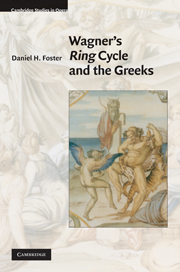Appendices: Wagner's primary and secondary sources
Published online by Cambridge University Press: 07 May 2010
Summary
INTRODUCTION
The following three appendices attempt briefly to introduce and give Wagner's opinion about all of the primary and secondary classical authors and sources that I could find specific mention of in writings about or by Wagner. Although Wagner owned more primary and secondary classical texts than are listed here, I have restricted myself to those that I can prove Wagner read or knew by reputation. Whenever possible I have also kept the entries brief because some authors seem to have had little influence on Wagner and those who were more influential are discussed more thoroughly in the body of this book. As for those authors who are only mentioned in these appendices, I have included them in order to provide what I believe is the most exhaustive list of its kind with respect to Wagner and the Greeks, in the hopes that this information may prove useful to future scholars.
In addition to my appendices on secondary scholars who influenced Wagner's concept of antiquity I might also have included a list of “secondary artists” inspired by antiquity who in turn inspired Wagner. At the top of this list would be authors such as Goethe and Schiller, but also lesser-known authors like Joseph Addison, who greatly inspired Wagner as a young boy with his play on Cato, especially the monologue spoken by the great Roman Stoic before his suicide. This list could also have contained artists who worked in genres other than literature.
- Type
- Chapter
- Information
- Wagner's Ring Cycle and the Greeks , pp. 267 - 268Publisher: Cambridge University PressPrint publication year: 2010



